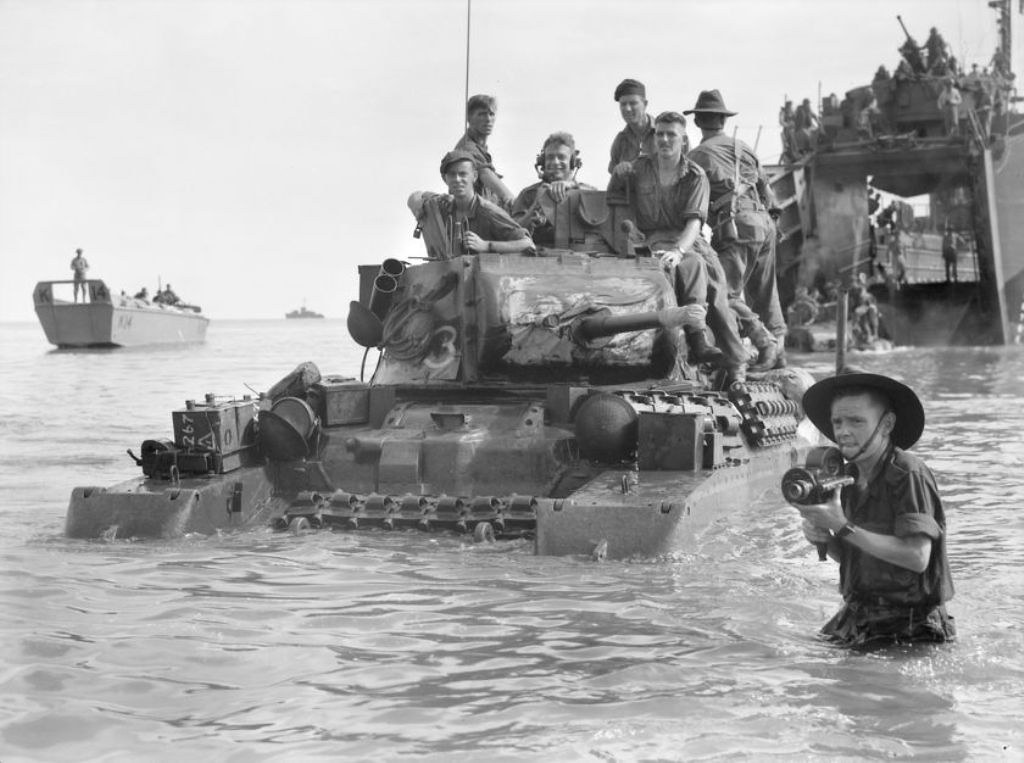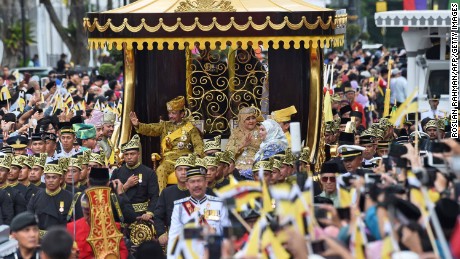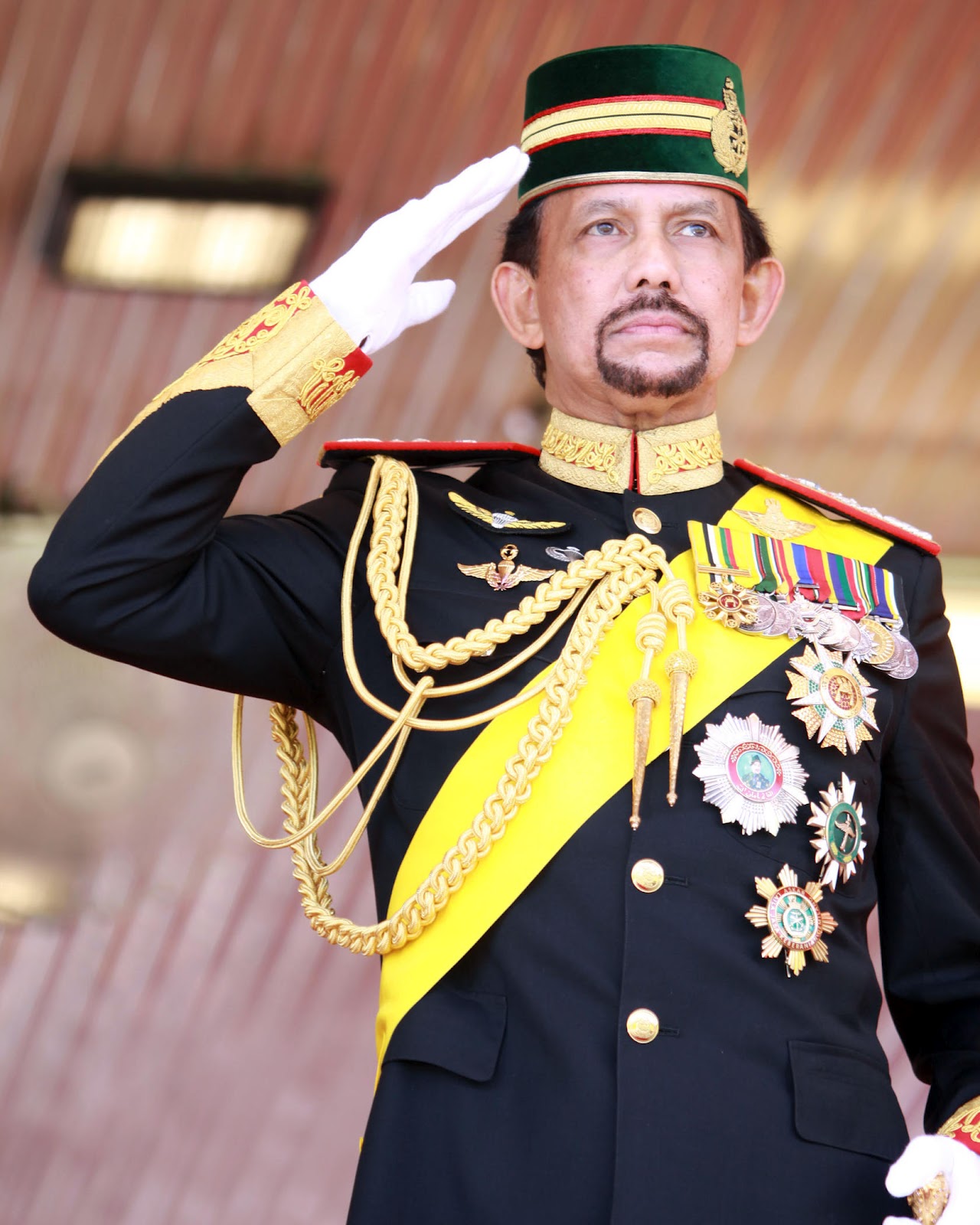Early history
The tomb of a ruler of Po-ni in Nanjing, Jiangsu, China. One of the earliest Chinese records is the 977 AD letter to Chinese emperor from the ruler of Po-ni, which some scholars believe to refer to Borneo. In 1225, a Chinese official, Chau Ju-Kua (Zhao Rugua), reported that Po-ni had 100 warships to protect its trade, and that there was a lot of wealth in the kingdom. In the fourteenth century, the Javanese manuscript Nagarakretagama, written by Prapanca in 1365, mentioned Barune as the vassal state of Majapahit, which had to make an annual tribute of 40 katis of camphor. In 1369, the Sulus attacked Po-ni, looting it of treasure and gold. A fleet from Majapahit succeeded in driving away the Sulus, but Po-ni was left weaker after the attack. A Chinese report from 1371 described Po-ni as poor and totally controlled by Majapahit. However, scholars claim that the power of the Sultanate of Brunei was at its peak between the 15th and 17th centuries, with its power extending from northern Borneo to the southern Philippines. By the 16th century, Islam was firmly rooted in Brunei, and the country had built one of its biggest mosques. In 1578, Alonso Beltrán, a Spanish traveller, described it as being five stories tall and built on the water.
War with Spain and decline
Brunei territorial losses from 1400 to 1890. European influence gradually brought an end to the regional power, as Brunei entered a period of decline compounded by internal strife over royal succession. Since the Spanish regarded Brunei the center of Islamic preaching in the Philippines Spain declared war in 1578, planning to attack and capture Kota Batu, Brunei’s capital at the time. This was based in part on the assistance of two Bruneian noblemen, Pengiran Seri Lela and Pengiran Seri Ratna. The former had travelled to Manila, then the centre of the Spanish colony, Manila itself was captured from Brunei and Christianised, Pengiran Seri Lela came to offer Brunei as a tributary to Spain for help to recover the throne usurped by his brother, Saiful Rijal. The Spanish agreed that if they succeeded in conquering Brunei, Pengiran Seri Lela would be appointed as the sultan, while Pengiran Seri Ratna would be the new Bendahara. In March 1578, the Spanish fleet had arrived from Mexico and settled at the Philippines, they were led by De Sande, acting as Capitán-General, he organised an expedition from Manila for Brunei. The expedition consisted of 400 Spanish, 1,500 Filipino natives and 300 Borneans. The campaign was one of many, which also included action in Mindanao and Sulu. The Spanish invaded the capital on 16 April 1578, with the help of Pengiran Seri Lela and Pengiran Seri Ratna. The Sultan Saiful Rijal and Paduka Seri Begawan Sultan Abdul Kahar were forced to flee to Meragang then to Jerudong. In Jerudong, they made plans to chase the conquering army away from Brunei. Suffering high fatalities due to a cholera or dysentery outbreak, the Spanish decided to abandon Brunei and returned to Manila on 26 June 1578, after 72 days. Before doing so, they burned the mosque, a high structure with a five-tier roof. Pengiran Seri Lela died in August or September 1578, probably from the same illness suffered by his Spanish allies. There was suspicion he could have been poisoned by the ruling sultan. Seri Lela’s daughter, a Bruneian princess had left with the Spanish, she married a Christian Tagalog, named Agustín de Legazpi de Tondo. The local Brunei accounts differ greatly from the generally accepted view of events. What was called the Castilian War was seen as a heroic episode, with the Spaniards being driven out by Bendahara Sakam, purportedly a brother of the ruling sultan, and a thousand native warriors. Most historians consider this to be a folk-hero account, which probably developed decades or centuries after. The country suffered a civil war from 1660 to 1673.
British intervention
The British have intervened in the affairs of Brunei on several occasions. Britain attacked Brunei in July 1846 due to internal conflicts over who was the rightful Sultan. In the 1880s, the decline of the Bruneian Empire continued. The sultan granted land (now Sarawak) to James Brooke, who had helped him quell a rebellion and allowed him to establish the Kingdom of Sarawak. Over time, Brooke and his nephews (who succeeded him) leased or annexed more land. Brunei lost much of its territory to him and his dynasty, known as the White Rajahs. Sultan Hashim Jalilul Alam Aqamaddin appealed to the British to stop further encroachment by the Brookes. The “Treaty of Protection” was negotiated by Sir Hugh Low and signed into effect on 17 September 1888. The treaty said that the sultan “could not cede or lease any territory to foreign powers without British consent”; it provided Britain effective control over Brunei’s external affairs, making it a British protectorate (which continued until 1984). But, when the Kingdom of Sarawak annexed Brunei’s Pandaruan District in 1890, the British did not take any action to stop it. They did not regard either Brunei or the Kingdom of Sarawak as ‘foreign’ (per the Treaty of Protection). This final annexation by Sarawak left Brunei with its current small land mass and separation into two parts. British residents were introduced in Brunei under the Supplementary Protectorate Agreement in 1906. The residents were to advise the sultan on all matters of administration. Over time, the resident assumed more executive control than the sultan. The residential system ended in 1959.
Discovery of oil
Petroleum was discovered in 1929 after several fruitless attempts. Two men, F. F. Marriot and T. G. Cochrane, smelled oil near the Seria river in late 1926. They informed a geophysicist, who conducted a survey there. In 1927, gas see pages were reported in the area. Seria Well Number One (S-1) was drilled on 12 July 1928. Oil was struck at 297 metres (974 ft) on 5 April 1929. Seria Well Number 2 was drilled on 19 August 1929, and, as of 2009, continues to produce oil. Oil production was increased considerably in the 1930s with the development of more oil fields. In 1940, oil production was at more than six million barrels. The British Malayan Petroleum Company (now Brunei Shell Petroleum Company) was formed on 22 July 1922. The first offshore well was drilled in 1957. Oil and natural gas have been the basis of Brunei’s development and wealth since the late 20th century.
Post-World War II

After World War II, a new government was formed in Brunei under the British Military Administration (BMA). It consisted mainly of Australian officers and servicemen. The administration of Brunei was passed to the Civil Administration on 6 July 1945. The Brunei State Council was also revived that year. The BMA was tasked to revive the Bruneian economy, which was extensively damaged by the Japanese during their occupation. They also had to put out the fires on the wells of Seria, which had been set by the Japanese prior to their defeat. Before 1941, the Governor of the Straits Settlements, based in Singapore, was responsible for the duties of British High Commissioner for Brunei, Sarawak, and North Borneo (now Sabah). The first British High Commissioner for Brunei was the Governor of Sarawak, Sir Charles Ardon Clarke. The Barisan Pemuda (“Youth Movement”) (abbreviated as BARIP) was the first political party to be formed in Brunei, on 12 April 1946. The party intended to “preserve the sovereignty of the Sultan and the country, and to defend the rights of the Malays”. BARIP also contributed to the composition of the country’s national anthem. The party was dissolved in 1948 due to inactivity. In 1959, a new constitution was written declaring Brunei a self-governing state, while its foreign affairs, security, and defence remained the responsibility of the United Kingdom. A small rebellion erupted against the monarchy in 1962, which was suppressed with help of the UK. Known as the Brunei Revolt, it contributed to the failure to create the North Borneo Federation. The rebellion partially affected Brunei’s decision to opt out of the Malaysian Federation. Brunei gained its independence from the United Kingdom on 1 January 1984. The official National Day, which celebrates the country’s independence, is held by tradition on 23 February.
National development plans

A series of National Development Plans was initiated by the 28th Sultan of Brunei, Omar Ali Saifuddien III. The first was introduced in 1953. A total sum of B$100 million was approved by the Brunei State Council for the plan. E.R. Bevington, from the Colonial Office in Fiji, was appointed to implement it. A $US14 million Gas Plant was built under the plan. In 1954, survey and exploration work were undertaken by the Brunei Shell Petroleum on both offshore and onshore fields. By 1956, production reached 114,700 bpd. The plan also aided the development of public education. By 1958, expenditure on education totalled at $4 million. Communications were improved, as new roads were built and reconstruction at Berakas Airport was completed in 1954.The second National Development Plan was launched in 1962. A major oil and gas field was discovered in 1963, with this discovery, Liquefied Natural Gas became important. Developments in the oil and gas sector have continued, and oil production has steadily increased since then. The plan also promoted the production of meat and eggs for consumption by citizens. The fishing industry increased its output by 25{72a3a428ed245ab94f83217e952940cc0d39d7c22fc0d4a369dd2ffd70d12031} throughout the course of the plan. The deepwater port at Muara was also constructed during this period. Power requirements were met, and studies were made to provide electricity to rural areas. Efforts were made to eradicate malaria, an endemic disease in the region, with the help of the World Health Organization. Malaria cases were reduced from 300 cases in 1953 to only 66 cases in 1959. The death rate was reduced from 20 per thousand in 1947 to 11.3 per thousand in 1953. Infectious disease has been prevented by public sanitation and improvement of drainage, and the provision of piped pure water to the population.
Independence

On 14 November 1971, Sultan Hassanal Bolkiah left for London to discuss matters regarding the amendments to the 1959 constitution. A new agreement was signed on 23 November 1971 with the British representative being Anthony Royle. This agreement also caused Gurkha units to be deployed in Brunei, where they remain up to this day. On 7 January 1979, another treaty was signed between Brunei and the UK. It was signed with Lord Goronwy-Roberts being the representative of the UK. This agreement granted Brunei to take over international responsibilities as an independent nation. Britain agreed to assist Brunei in diplomatic matters. In May 1983, it was announced by the UK that the date of independence of Brunei would be 1 January 1984. On 31 December 1983, a mass gathering was held on main mosques on all four of the districts of the country and at midnight, on 1 January 1984, the Proclamation of Independence was read by Sultan Hassanal Bolkiah. The sultan subsequently assumed the title “His Majesty”, rather than the previous “His Royal Highness”. Brunei was admitted to the United Nations on 22 September 1984, becoming the organisation’s 159th member.
21 Century

In October 2013, Sultan Hassanal Bolkiah announced his intention to impose Penal Code from the Sharia law on the country’s Muslims, which make up roughly two thirds of the country’s population. This would be implemented in three phases, culminating in 2016, and making Brunei the first and only country in East Asia to introduce Sharia law into its penal code. The move attracted international criticism, the United Nations expressing “deep concern”.












